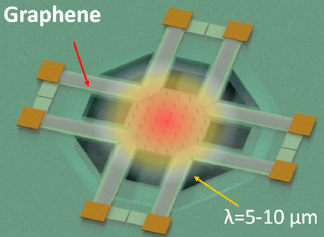Science Fiction
Dictionary
A B C D E F G H I J K L M N O P Q R S T U V W X Y Z
Graphene Thermopile May Grant Predator Heat Vision To Humans

In the 1987 movie Predator, the aliens make use of slim, sophisticated devices to see the heat signatures of their opponents. Not to mention the succeeding movies in this franchise.
(Predator heat vision compilation video)
MIT researchers have been working on devices that will allow human beings to make use of heat imaging, without the bulky cryogenic cooling systems and other bulky tech that plague human devices.
To find a more practical solution, researchers at MIT, Harvard, Army Research Laboratory, and University of California, Riverside, have developed an advanced device by integrating graphene with silicon microelectromechanical systems (MEMS) to make a flexible, transparent, and low-cost device for the mid-infrared range.Testing showed it could be used to detect a personís heat signature at room temperature (300 K or 27 degrees C/80 degrees F) without cryogenic cooling.
Future advances could make the device even more versatile. The researchers say that a thermal sensor could be based on a single layer of graphene, which would make it both transparent and flexible. Also, manufacturing could be simplified, which would bring costs down.

(From Schematic of graphene thermopile )
Via KurzweilAI.
Scroll down for more stories in the same category. (Story submitted 11/3/2015)
Follow this kind of news @Technovelgy.| Email | RSS | Blog It | Stumble | del.icio.us | Digg | Reddit |
Would
you like to contribute a story tip?
It's easy:
Get the URL of the story, and the related sf author, and add
it here.
Comment/Join discussion ( 0 )
Related News Stories - (" Surveillance ")
Perching Ambush Drones
'On the chest of drawers something was perched.' - Philip K. Dick, 1956.
India Ponders Always-On Smartphone Location Tracking
'It is necessary... for your own protection.' - Jack Vance, 1954.
LingYuan Vehicle Roof Drones Now Available, ala Blade Runner 2049
Accompanied by a small selection of similar ideas from science fiction.
Chameleon Personalized Privacy Protection Mask
'...the Virtual Epiphantic Identity Lustre.' - Neal Stephenson, 2019.
Technovelgy (that's tech-novel-gee!) is devoted to the creative science inventions and ideas of sf authors. Look for the Invention Category that interests you, the Glossary, the Invention Timeline, or see what's New.
Science Fiction
Timeline
1600-1899
1900-1939
1940's 1950's
1960's 1970's
1980's 1990's
2000's 2010's
Current News
The New Habitable Zones Include Asimov's Ribbon Worlds
'...there's a narrow belt where the climate is moderate.'
Can One Robot Do Many Tasks?
'... with the Master-operator all you have to do is push one! A remarkable achievement!'
Atlas Robot Makes Uncomfortable Movements
'Not like me. A T-1000, advanced prototype. A mimetic poly-alloy. Liquid metal.'
Boring Company Drills Asimov's Single Vehicle Tunnels
'It was riddled with holes that were the mouths of tunnels.'
Humanoid Robots Tickle The Ivories
'The massive feet working the pedals, arms and hands flashing and glinting...'
A Remarkable Coincidence
'There is a philosophical problem of some difficulty here...'
Cortex 1 - Today A Warehouse, Tomorrow A Calculator Planet
'There were cubic miles of it, and it glistened like a silvery Christmas tree...'
Perching Ambush Drones
'On the chest of drawers something was perched.'
Leader-Follower Autonomous Vehicle Technology
'Jason had been guiding the caravan of cars as usual...'
Golf Ball Test Robot Wears Them Out
"The robot solemnly hit a ball against the wall, picked it up and teed it, hit it again, over and again...'
Boring Company Vegas Loop Like Asimov Said
'There was a wall ahead... It was riddled with holes that were the mouths of tunnels.'
Rigid Metallic Clothing From Science Fiction To You
'...support the interior human structure against Jupiterís pull.'
Is The Seattle Ultrasonics C-200 A Heinlein Vibroblade?
'It ain't a vibroblade. It's steel. Messy.'
Roborock Saros Z70 Is A Robot Vacuum With An Arm
'Anything larger than a BB shot it picked up and placed in a tray...'
A Beautiful Visualization Of Compact Food
'The German chemists have discovered how to supply the needed elements in compact, undiluted form...'
Bone-Building Drug Evenity Approved
'Compounds devised by the biochemists for the rapid building of bone...'
